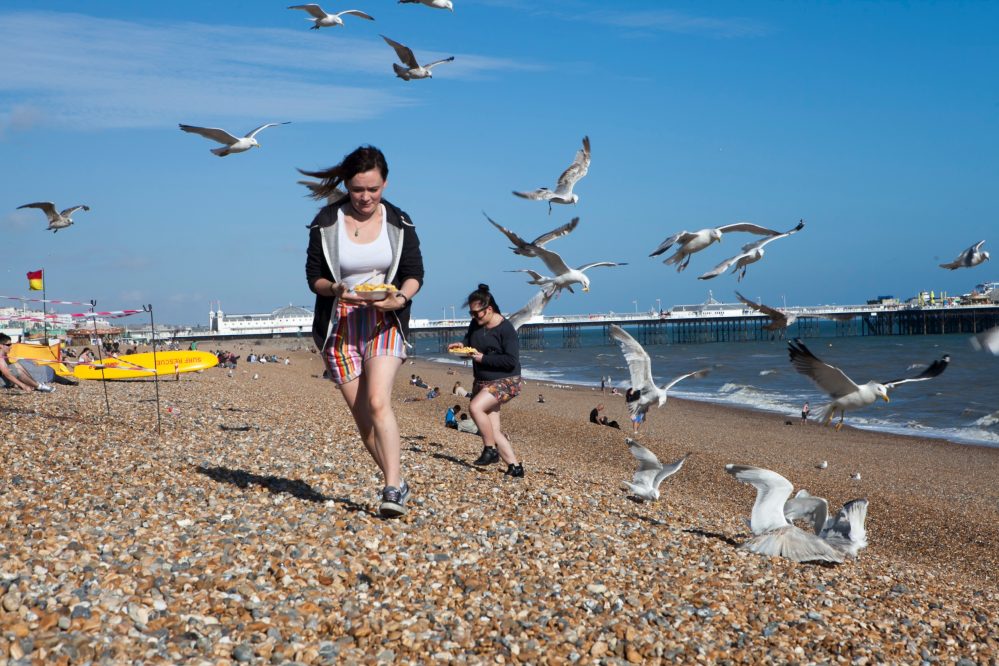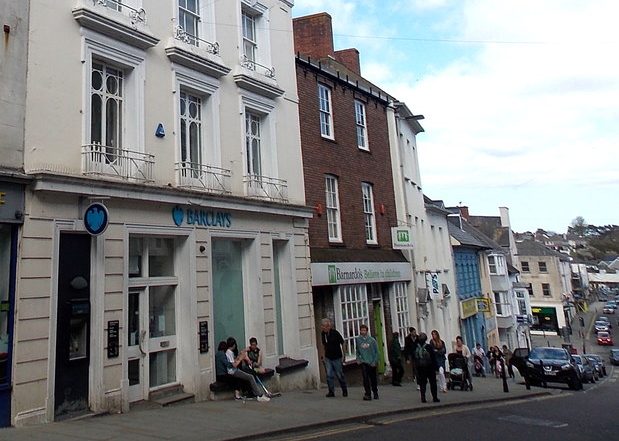Community
Homelessness: Gap between perception and reality
ALMOST half of online adults aged 18+ in Wales (46 per cent) say they always, or almost always do nothing when they see someone in the street who is  homeless, compared to 54 per cent across the UK. More than a quarter of people in Wales say the main cause of homelessness is alcohol or drug addiction (30 per cent), followed by debt (20 per cent), according to new research commissioned by The Salvation Army.
homeless, compared to 54 per cent across the UK. More than a quarter of people in Wales say the main cause of homelessness is alcohol or drug addiction (30 per cent), followed by debt (20 per cent), according to new research commissioned by The Salvation Army.
The Salvation Army also carried out a survey of more than 300 residents of its centres (Lifehouses) for people experiencing homelessness, including Swan Lodge in Sunderland, and reveals a worrying gap between the reality of what it’s like to be homeless and the perception of the general public.
The Church and charity is warning that without greater education this gap will widen, making it harder for people who are experiencing homelessness to get their lives back on track which could risk increasing the cost to society in the future.
Major Howard Russell, Deputy Territorial Director of Homelessness Services at The Salvation Army, said: “At The Salvation Army we are working to end the cycle of homelessness and one of the key hurdles we face is around people’s attitudes as our research has revealed the general public believe alcohol and drugs are the root cause of homelessness when, in our experience, this isn’t the case. We believe educating the public on the reality of what causes homelessness is the way to overcome this.”
The Church and charity’s survey of its Lifehouses, reveals the main cause of homelessness is relationship breakdown (43 per cent), followed by a combination of issues (16 per cent), physical or mental health problems (13 per cent), job loss (11 per cent), then addiction (10 per cent), and finally debt (6 per cent).
Major Russell said: “While the general public appear to be aware that there are a variety of causes of homelessness, more than a quarter of people incorrectly perceive drug and alcohol addiction to be the main cause.
“Yes, alcohol and drugs may be a problem for many people experiencing homeless, this often comes as a result of homelessness and, as our survey of our Lifehouse residents shows, it is rarely the cause. Instead, it is relationship breakdown, something that can happen to anyone at any time.”
While revealing that 73 per cent of those in Wales say that at least some of the time they do nothing when they see someone who is experiencing homelessness, 41 per cent say they give cash at least sometimes, 26 per cent sometimes purchased something to eat or drink and 15 per cent say that they at least sometimes find out where the nearest homelessness service is and pass on the details to the person who was sleeping rough.
Major Russell continued: “We find it quite shocking that such a large proportion of the public polled would simply walk on by, doing nothing for a person sleeping rough.
“It isn’t an issue that can be ignored and we believe awareness needs to be raised. Our extensive experience has shown us that homelessness can affect anyone, and so it is surprising that the Ipsos MORI poll has revealed 36 per cent of people in Wales don’t think that they, or someone close to them could ever experience homelessness. At our Lifehouses you’ll find many people who previously worked in a range of professions and skilled jobs.”
The Church and charity’s survey of Lifehouses reported that 89 per cent of residents agreed that if there was one thing they wished they’d known before they experienced homelessness it was that it can happen to anyone.
The Salvation Army believe the Ipsos MORI research reveals a lack of understanding around who can be affected by homelessness as 21 per of people say it is not at all likely that someone with a job that requires a professional qualification could ever become homeless.
Interestingly the survey of Salvation Army Lifehouse residents shows that 72 per cent worked before they experienced homelessness. In addition, 65 per cent reported that employers treat them differently when they find out they’re homeless. For 70 per cent people in general treat them differently because they are experiencing homelessness.
Damon Short is a resident at Ty Gobaith Lifehouse in Cardiff. He lived on the streets for over 30 years after being in care, approved schools, hostels and jail.
He was approached by an outreach worker of the Bridge Programme at The Salvation Army and slowly began to rebuild his life. He is now a volunteer on the church and charity’s Bus Project for rough sleepers and credits The Salvation Army with helping turn his life around.
He said: “My early experiences in life made me institutionalised but I liked being on the streets because I was meeting new people and there was always something new to do etc. So my life (existence) was centred on drink and drugs resulting in me having no food – this was my situation for a long, long time.
“My Mother moved to Cardiff and I started to help her as she was alcohol and hash dependant. It made things easier for me to see her but to be honest this also made things harder for me as my health was getting worse daily.
“During one of my admissions to hospital for my drinking I was approached by the outreach worker of the Bridge Programme at The Salvation Army. A place was made available and even though I was unsure about what it was or what I could do there I accepted it. During the early days of being there a few of my friends passed away and I found the programme hard to say the least. I eventually got my detox date in the local hospital – this really scared me and I wondered what would be left in life or how I would feel without drink or drugs in my life.
“I completed my detox – I was chuffed, I’d actually done it. It felt all new and weird at first, I wasn’t too sure if I liked it or not. After a few weeks my Mother had become more and more withdrawn, her moods had changed which sadly resulted in her taking her own life. I was devastated! I attended the cremation but didn’t want to attend the wake as I knew it could start me back drinking and if I started drinking over this sadness I wouldn’t come out the other side whole.
“This actually made me stronger and gave me such determination to stay dry and clean. Initially I thought the Bridge Programme wasn’t what I wanted – how wrong was I! After a little time I started with help to deal with my feelings and thoughts, it was then that I started to live rather than exist!
The daily group sessions became exciting and I engaged fully in them, this boosted my confidence and self belief. I started to volunteer at a Peer Mentoring Group after passing the appropriate courses arranged by the Skills department. My courses have given me options to eventually achieve a NVQ via OCNs and Learn Direct.
“Recently I have regained contact with my children after seven years which is brilliant. I also volunteer on The Salvation Army’s Outreach Bus Project with the rough sleepers of Cardiff – I enjoy this immensely as I relate fully. It will only be a matter of time before I also start to assist at the local needle exchange project.
“All these placements and meetings are so worthwhile as now I’ve a purpose to get up in the mornings; my confidence and independence is such that I can’t wait for my own property to become available.
I would never have thought that I would ever be where I am today; it just proves how far I’ve come with the help and assistance of everyone who has invested their time and effort into my recovery. I am the man I am today because people believed in me and I started to believe in myself – I am now a happy, excited and purposeful person.”
The survey of Lifehouse residents reveals 68 per cent feel that people see their homelessness rather than them as a person.
The Ipsos MORI survey of online adults in the UK goes further in revealing the challenges faced by people once they have secured somewhere permanent to live and got their lives back on track, as 58 per cent agree that employers are less likely to give jobs to people who have previously experienced homelessness.
Major Russell concluded: “The MORI poll result appears to suggest that people believe once you’ve experienced homelessness employers will think twice about giving you a job. At The Salvation Army we never give up on anyone as we believe in helping individuals to reach their full potential, whatever that may be, and we would like to encourage people to put themselves in the shoes of a someone experiencing homelessness, as it is something that can happen to anyone, it’s not just alcoholics and drug addicts.”
The Salvation Army is an expert in running services for people experiencing homelessness and understands that a tailored and personal approach is needed when providing support. The Church and charity is keen to demonstrate that it’s not a simple case of providing accommodation as it employs a skilled workforce who are there at every step of the way to walk alongside residents and equip them with the skills and support they need to reach their full potential, whether that be employment, re-connecting with family or beating an addiction.
In total The Salvation Army have more than 80 homelessness services around the UK and the Republic of Ireland. It runs a number of courses and activities at all it’s Lifehouses which range from employment skills and cookery classes to how to keep their tenancy when they get somewhere to live, an important part of breaking the cycle of homelessness.
According to The Salvation Army’s survey, 76 per cent of residents take part in at least one activity on offer and 32 per cent do all the courses available to them, which the Church and charity believe shows how keen residents are to get their lives on track, if society will allow them the opportunity.
This year The Salvation Army is celebrating 150 years of transforming lives and it is still at the heart of every community today, supporting those in need.
If a member of the public sees someone rough sleeping The Salvation Army would like to suggest the public visit their local council’s website for 24 hour assistance on what they can do to help someone who is sleeping rough or experiencing homelessness.
Community
Be wary of gulls as breeding season approaches

AS families across Wales head to the seaside for the bank holiday weekend, a national trade body is urging people to be wary of gulls as their egg-laying season gets underway.
During the breeding season, gulls have been known to launch attacks on people, says British Pest Control Association (BPCA).
After mating and nest-building in February and March, many gulls will be protecting nests and eggs towards the end of April and into May.
However, BPCA is also reminding people that avoiding gulls wherever possible is always the best course of action as interfering with wild birds, their eggs or nests could lead to prosecution.
The Wildlife and Countryside Act 1981 states that all wild birds and their eggs are protected, but people with the appropriate knowledge on licences, such as BPCA members, can take steps if the birds are causing a public health and safety concern.
Natalie Bungay, Technical Manager at BPCA, said: “We love British birds. All wild birds and their eggs are rightfully protected by law in the UK, so it is absolutely vital that holidaymakers, householders or business owners don’t interfere with them.
“However, gulls can pose a serious safety concern. They have been known to attack people unexpectedly, which can be a frightening experience, especially if they draw blood, which can occasionally happen.
“We often think of gulls as a coastal problem – which they can be in seaside towns where people have fed them regularly. But for some time now they have also been an increasing problem in towns and cities away from the coast too.”
Gulls can live for 25 to 30 years and many weigh around 1kg, with wingspans of around one metre.
Seaside visitors can try to avoid attracting gulls by ensuring picnic foods or chippy take-aways are kept covered or eaten out of sight of gulls where possible.
Nesting gulls can cause problems for homes and businesses both on the coast and inland, as well as at supermarkets and hospitals, as these buildings can offer ideal nesting sites which are difficult to access and proof.
Nests can clog gutters or chimneys, which may cause water overflows, or potential issues with carbon monoxide, as well as bringing a risk of secondary infestation from bird mites, ticks, fleas and beetles.
Properties are also at risk from bird droppings, which can carry some harmful bacteria and diseases, as well as even cause slips, trips and falls where they build up.
Natalie added: “Gulls are also protected by the law, so it really is important to seek professional help.
“BPCA members are trained in bird control and will be able to offer a management plan that will alleviate the issue.
“There are a variety of bird-proofing measures available, all of which will deter birds without causing them harm, and as gulls are large and heavy, any proofing measures need to be suitable for the job, very heavy duty and correctly installed by a professional.
“Bird prevention, proofing and control is a highly specialised area requiring specific equipment and techniques. Pest professionals are required to try all reasonably practicable non-lethal bird control methods before they consider lethal control.
“Always consult a BPCA member before considering any form of bird management. You could be prosecuted if you illegally interfere with a bird, its nest or eggs.”
BPCA members are trained, experienced professionals with access to a range of specialist products not available to the public, as well as being regularly assessed to the British Standard in Pest Management BS EN 16636.
BPCA members are also endorsed by the Government via the TrustMark quality scheme.
To find a professional pest controller visit bpca.org.uk/find
Community
Social housing plans for Cleddau Bridge Hotel site backed

A SCHEME to build 38 affordable and social housing units on the site of a fire-ravaged former Pembrokeshire hotel has been backed by senior Pembrokeshire councillors.
Pembrokeshire County Council’s Cabinet, meeting on April 22, supported a contract with developer Castell Group Ltd for the mix of affordable homes and social housing units at the Cleddau Bridge Hotel site, Pembroke Dock.
Members, in a report presented by Cabinet Member for Planning & Housing Delivery Cllr Jon Harvey, heard Castell had approached the council’s housing service to determine whether there is an interest in working with them to bring forward the development as a social/affordable housing site.
Castell Construction Ltd specialises in the construction of affordable / social housing, typically for registered social landlords across south Wales, and hopes to build 12 one-bedroom flats, 15 two-bed houses, five three-bed, two four-bed, and four two-bed bungalows.
The development package would be part-funded from the housing revenue account, the remainder from the Social Housing Grant and/or second homes premium for affordable housing if it becomes available for the Housing Service to use in this manner.
Cllr Harvey – who moved approval – said the scheme was expected to provide £230,000 a year in rentals income, describing it as “an excellent opportunity to work with a proven developer for extra social housing in an area of proven need.”
Deputy Leader Cllr Paul Miller said he was supportive of the scheme, as was local member Cllr Joshua Beynon, saying: “It’s a bit of an eyesore at the moment, if we can bring this site back into meaningful use, and in an area where there is a need, I’m all in support of this.”
Members backed senior officers be delegated powers to enter into the works contract, and to have powers to proceed with the land acquisition.
If a subsequent planning permission is secured for the site, the homes could be built by autumn 2026.
In a prime location at one of the entrances to Pembroke Dock, the former Cleddau Bridge Hotel has been derelict since a fire in March 2019, which brought emergency services from as far afield as Ammanford, Aberystwyth and Swansea.
Community
County Hall to offer space for community banking

A CALL for Pembrokeshire County Council to potentially change its banking arrangement with Barclays, after it closed its Haverfordwest branch has been turned down, but County Hall is to offer space for community banking.
Barclays Bank, on the town’s High Street, is to close on May 10.
The council has had a banking services contract with Barclays since 2013.
Councillor Huw Murphy, in a notice of motion heard by Pembrokeshire County Council’s Cabinet meeting of April 22, asked the council to review its banking arrangements with Barclays following the announced closure.
e said the loss of a branch “not only impacts upon town centres and businesses but also disproportionately impacts the elderly who are less likely to embrace on-line banking options”.
A report for Cabinet members said, in terms of the impact on Pembrokeshire residents, Barclays has said that it is “not leaving Haverfordwest and [will] continue to provide face-to-face support for those who need it” via community locations.
Two options were presented to Cabinet: to retender the banking services contract, and, the favoured, to work with Barclays to ensure a community location is set up in Haverfordwest.
Members heard the costs associated with moving to a new banking service provider could be in excess of £50,000.
For the second, favoured option, members heard Barclays was in discussions with the council about a location for potential community banking.
Cabinet Member for Corporate Finance Cllr Alec Cormack, after outlining the risks in the report for members, and moving the notice be not adopted, said he had “considerable sympathy” with Cllr Murphy’s notice.
He told councillors there was a glimmer of light for banking arrangements in the county, with an agreement now signed for two ground floor rooms at County Hall, Haverfordwest, to be used for community banking.
From April 25, the rooms will be available on Wednesdays, Thursdays, and Fridays, members heard.
Cabinet Member for Planning & Housing Delivery Cllr Jon Harvey also said he had “a lot of sympathy” for the motion, adding: “It’s excellent news a deal has been struck to occupy the ground floor rooms three days a week; hopefully this will mitigate, to a certain amount, the closure.
“If we can work with the respective banks to get a community-type approach let’s move forward.”
-

 News5 days ago
News5 days agoPolice issue update on the search for Luke, missing from Pembroke Dock
-

 News10 hours ago
News10 hours agoPolice and air ambulances at ‘serious incident’ at West Wales school
-

 Sport6 days ago
Sport6 days agoHerbrandston Clinch Promotion to Division One
-

 News4 days ago
News4 days ago20mph U-turn: Some roads will return to 30mph following public outcry
-

 Community4 days ago
Community4 days agoMiracle pup finds her forever home after heart-wrenching journey
-

 Community2 days ago
Community2 days agoCounty Hall to offer space for community banking
-

 Crime2 days ago
Crime2 days agoBrian Davis: Wanted on suspicion of commercial burglary
-

 News7 days ago
News7 days agoFirst step towards council tax and business rate reform





























